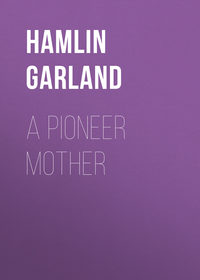 полная версия
полная версияA Son of the Middle Border
Joseph Kirkland was at this time nearly sixty years of age, a small, alert, dark-eyed man, a lawyer, who lived in what seemed to me at the time, plutocratic grandeur, but in spite of all this, and notwithstanding the difference in our ages, I liked him and we formed an immediate friendship. "Mrs. Kirkland and my daughters are in Michigan for the summer," he explained, "and I am camping in my study." I was rather glad of this arrangement for, having the house entirely to ourselves, we could discuss realism, Howells and the land-question with full vigor and all night if we felt like it.
Kirkland had read some of my western sketches and in the midst of his praise of them suddenly asked, "Why don't you write fiction?"
To this I replied, "I can't manage the dialogue."
"Nonsense!" said he. "You're lazy, that's all. You use the narrative form because it's easier. Buckle to it – you can write stories as well as I can – but you must sweat!"
This so surprised me that I was unable to make any denial of his charge. The fact is he was right. To compose a page of conversation, wherein each actor uses his own accent and speaks from his own point of view, was not easy. I had dodged the hard spots.
The older man's bluntness and humor, and his almost wistful appreciation of my youth and capacity for being moved, troubled me, absorbed my mind even during our talk. Some of his words stuck like burrs, because they seemed so absurd. "When your name is known all over the West," he said in parting, "remember what I say. You can go far if you'll only work. I began too late. I can't emotionalize present day western life – you can, but you must bend to your desk like a man. You must grind!"
I didn't feel in the least like a successful fictionist and being a household word seemed very remote, – but I went away resolved to "grind" if grinding would do any good.
Once out of the city, I absorbed "atmosphere" like a sponge. It was with me no longer (as in New England) a question of warmed-over themes and appropriated characters. Whittier, Hawthorne, Holmes, had no connection with the rude life of these prairies. Each weedy field, each wire fence, the flat stretches of grass, the leaning Lombardy trees, – everything was significant rather than beautiful, familiar rather than picturesque.
Something deep and resonant vibrated within my brain as I looked out upon this monotonous commonplace landscape. I realized for the first time that the east had surfeited me with picturesqueness. It appeared that I had been living for six years amidst painted, neatly arranged pasteboard scenery. Now suddenly I dropped to the level of nature unadorned, down to the ugly unkempt lanes I knew so well, back to the pungent realities of the streamless plain.
Furthermore I acknowledged a certain responsibility for the conditions of the settlers. I felt related to them, an intolerant part of them. Once fairly out among the fields of northern Illinois everything became so homely, uttered itself so piercingly to me that nothing less than song could express my sense of joy, of power. This was my country – these my people.
It was the third of July, a beautiful day with a radiant sky, darkened now and again with sudden showers. Great clouds, trailing veils of rain, enveloped the engine as it roared straight into the west, – for an instant all was dark, then forth we burst into the brilliant sunshine careening over the green ridges as if drawn by runaway dragons with breath of flame.
It was sundown when I crossed the Mississippi river (at Dubuque) and the scene which I looked out upon will forever remain a splendid page in my memory. The coaches lay under the western bluffs, but away to the south the valley ran, walled with royal purple, and directly across the flood, a beach of sand flamed under the sunset light as if it were a bed of pure untarnished gold. Behind this an island rose, covered with noble trees which suggested all the romance of the immemorial river. The redman's canoe, the explorer's batteau, the hunter's lodge, the emigrant's cabin, all stood related to that inspiring vista. For the first time in my life I longed to put this noble stream into verse.
All that day I had studied the land, musing upon its distinctive qualities, and while I acknowledged the natural beauty of it, I revolted from the gracelessness of its human habitations. The lonely boxlike farm-houses on the ridges suddenly appeared to me like the dens of wild animals. The lack of color, of charm in the lives of the people anguished me. I wondered why I had never before perceived the futility of woman's life on a farm.
I asked myself, "Why have these stern facts never been put into our literature as they have been used in Russia and in England? Why has this land no story-tellers like those who have made Massachusetts and New Hampshire illustrious?"
These and many other speculations buzzed in my brain. Each moment was a revelation of new uglinesses as well as of remembered beauties.
At four o'clock of a wet morning I arrived at Charles City, from which I was to take "the spur" for Osage. Stiffened and depressed by my night's ride, I stepped out upon the platform and watched the train as it passed on, leaving me, with two or three other silent and sleepy passengers, to wait until seven o'clock in the morning for the "accommodation train." I was still busy with my problem, but the salient angles of my interpretation were economic rather than literary.
Walking to and fro upon the platform, I continued to ponder my situation. In a few hours I would be among my old friends and companions, to measure and be measured. Six years before I had left them to seek my fortune in the eastern world. I had promised little, – fortunately – and I was returning, without the pot of gold and with only a tinge of glory.
Exteriorly I had nothing but a crop of sturdy whiskers to show for my years of exile but mentally I was much enriched. Twenty years of development lay between my thought at the moment and those of my simpler days. My study of Spencer, Whitman and other of the great leaders of the world, my years of absorbed reading in the library, my days of loneliness and hunger in the city had swept me into a far bleak land of philosophic doubt where even the most daring of my classmates would hesitate to follow me.
A violent perception of the mysterious, the irrevocable march of human life swept over me and I shivered before a sudden realization of the ceaseless change and shift of western life and landscape. How few of those I knew were there to greet me! Walter and Charles were dead, Maud and Lena were both married, and Burton was preaching somewhere in the West.
Six short years had made many changes in the little town and it was in thinking upon these changes that I reached a full realization of the fact that I was no longer a "promising boy" of the prairie but a man, with a notion of human life and duty and responsibility which was neither cheerful nor resigned. I was returning as from deep valleys, from the most alien climate.
Looking at the sky above me, feeling the rush of the earth beneath my feet I saw how much I had dared and how little, how pitifully little I had won. Over me the ragged rainclouds swept, obscuring the stars and in their movement and in the feeling of the dawn lay something illimitable and prophetic. Such moments do not come to men often – but to me for an hour, life was painfully purposeless. "What does it all mean?" I asked myself.
At last the train came, and as it rattled away to the north and I drew closer to the scenes of my boyhood, my memory quickened. The Cedar rippling over its limestone ledges, the gray old mill and the pond where I used to swim, the farm-houses with their weedy lawns, all seemed not only familiar but friendly, and when at last I reached the station (the same grimy little den from which I had started forth six years before), I rose from my seat with the air of a world-traveller and descended upon the warped and splintered platform, among my one time friends and neighbors, with quickened pulse and seeking eye.
It was the fourth of July and a crowd was at the station, but though I recognized half the faces, not one of them lightened at sight of me. The 'bus driver, the ragged old dray-man (scandalously profane), the common loafers shuffling about, chewing and spitting, seemed absolutely unchanged. One or two elderly citizens eyed me closely as I slung my little Boston valise with a long strap over my shoulder and started up the billowing board sidewalk toward the center of the town, but I gave out no word of recognition. Indeed I took a boyish pride in the disguising effect of my beard.
How small and flat and leisurely the village seemed. The buildings which had once been so imposing in my eyes were now of very moderate elevation indeed, and the opera house was almost indistinguishable from the two-story structures which flanked it; but the trees had increased in dignity, and some of the lawns were lovely.
With eyes singling out each familiar object I loitered along the walk. There stood the grimy wagon shop from which a hammer was ringing cheerily, like the chirp of a cricket, – just as aforetime. Orrin Blakey stood at the door of his lumber yard surveying me with curious eyes but I passed him in silence. I wished to spend an hour or two in going about in guise of a stranger. There was something instructive as well as deliciously exciting in thus seeing old acquaintances as from behind a mask. They were at once familiar and mysterious – mysterious with my new question, "Is this life worth living?"
The Merchants' Hotel which once appeared so luxurious (within the reach only of great lecturers like Joseph Cook and Wendell Phillips) had declined to a shabby frame tavern, but entering the dining room I selected a seat near an open window, from which I could look out upon the streets and survey the throng of thickening sightseers as they moved up and down before me like the figures in a vitascope.
I was waited upon by a slatternly girl and the breakfast she brought to me was so bad (after Mary's cooking) that I could only make a pretense of eating it, but I kept my seat, absorbed by the forms coming and going, almost within the reach of my hand. Among the first to pace slowly by was Lawyer Ricker, stately, solemn and bibulous as ever, his red beard flowing over a vest unbuttoned in the manner of the old-fashioned southern gentleman, his spotless linen and neat tie showing that his careful, faithful wife was still on guard.
Him I remembered for his astounding ability to recite poetry by the hour and also because of a florid speech which I once heard him make in the court room. For six mortal hours he spoke on a case involving the stealing of a horse-blanket worth about four dollars and a half. In the course of his argument he ranged with leisurely self-absorption, from ancient Egypt and the sacred Crocodile down through the dark ages, touching at Athens and Mount Olympus, reviewing Rome and the court of Charlemagne, winding up at four P. M. with an impassioned appeal to the jury to remember the power of environment upon his client. I could not remember how the suit came out, but I did recall the look of stupefaction which rested on the face of the accused as he found himself likened to Gurth the swine-herd and a peasant of Carcassone.
Ricker seemed quite unchanged save for the few gray hairs which had come into his beard and, as he stood in conversation with one of the merchants of the town, his nasal voice, his formal speech and the grandiloquent gesture of his right hand brought back to me all the stories I had heard of his drinking and of his wife's heroic rescuing expeditions to neighboring saloons. A strange, unsatisfactory end to a man of great natural ability.
Following him came a young girl leading a child of ten. I knew them at once. Ella McKee had been of the size of the little one, her sister, when I went away, and nothing gave me a keener realization of the years which had passed than the flowering of the child I had known into this charming maiden of eighteen. Her resemblance to her sister Flora was too marked to be mistaken, and the little one by her side had the same flashing eyes and radiant smile with which both of her grown up sisters were endowed. Their beauty fairly glorified the dingy street as they walked past my window.
Then an old farmer, bent and worn of frame, halted before me to talk with a merchant. This was David Babcock, Burton's father, one of our old time neighbors, a little more bent, a little thinner, a little grayer – that was all, and as I listened to his words I asked, "What purpose does a man serve by toiling like that for sixty years with no increase of leisure, with no growth in mental grace?"
There was a wistful note in his voice which went straight to my heart. He said: "No, our wheat crop ain't a-going to amount to much this year. Of course we don't try to raise much grain – it's mostly stock, but I thought I'd try wheat again. I wisht we could get back to the good old days of wheat raising – it w'ant so confining as stock-raisin'." His good days were also in the past!
As I walked the street I met several neighbors from Dry Run as well as acquaintances from the Grove. Nearly all, even the young men, looked worn and weather-beaten and some appeared both silent and sad. Laughter was curiously infrequent and I wondered whether in my days on the farm they had all been as rude of dress, as misshapen of form and as wistful of voice as they now seemed to me to be. "Have times changed? Has a spirit of unrest and complaining developed in the American farmer?"
I perceived the town from the triple viewpoint of a former resident, a man from the city, and a reformer, and every minutest detail of dress, tone and gesture revealed new meaning to me. Fancher and Gammons were feebler certainly, and a little more querulous with age, and their faded beards and rough hands gave pathetic evidence of the hard wear of wind and toil. At the moment nothing glozed the essential tragic futility of their existence.
Then down the street came "The Ragamuffins," the little Fourth of July procession, which in the old days had seemed so funny, so exciting to me. I laughed no more. It filled me with bitterness to think that such a makeshift spectacle could amuse anyone. "How dull and eventless life must be to enable such a pitiful travesty to attract and hold the attention of girls like Ella and Flora," I thought as I saw them standing with their little sister to watch "the parade."
From the window of a law office, Emma and Matilda Leete were leaning and I decided to make myself known to them. Emma, who had been one of my high admirations, had developed into a handsome and interesting woman with very little of the village in her dress or expression, and when I stepped up to her and asked, "Do you know me?" her calm gray eyes and smiling lips denoted humor. "Of course I know you – in spite of the beard. Come in and sit with us and tell all of us about yourself."
As we talked, I found that they, at least, had kept in touch with the thought of the east, and Ella understood in some degree the dark mood which I voiced. She, too, occasionally doubted whether the life they were all living was worth while. "We make the best of it," she said, "but none of us are living up to our dreams."
Her musical voice, thoughtful eyes and quick intelligence, re-asserted their charm, and I spent an hour or more in her company talking of old friends. It was not necessary to talk down to her. She was essentially urban in tone while other of the girls who had once impressed me with their beauty had taken on the airs of village matrons and did not interest me. If they retained aspirations they concealed the fact. Their husbands and children entirely occupied their minds.
Returning to the street, I introduced myself to Uncle Billy Fraser and Osmund Button and other Sun Prairie neighbors and when it became known that "Dick Garland's boy" was in town, many friends gathered about to shake my hand and inquire concerning "Belle" and "Dick."
The hard, crooked fingers, which they laid in my palm completed the sorrowful impression which their faces had made upon me. A twinge of pain went through my heart as I looked into their dim eyes and studied their heavy knuckles. I thought of the hand of Edwin Booth, of the flower-like palm of Helena Modjeska, of the subtle touch of Inness, and I said, "Is it not time that the human hand ceased to be primarily a bludgeon for hammering a bare living out of the earth? Nature all bountiful, undiscriminating, would, under justice, make such toil unnecessary." My heart burned with indignation. With William Morris and Henry George I exclaimed, "Nature is not to blame. Man's laws are to blame," – but of this I said nothing at the time – at least not to men like Babcock and Fraser.
Next day I rode forth among the farms of Dry Run, retracing familiar lanes, standing under the spreading branches of the maple trees I had planted fifteen years before. I entered the low stone cabin wherein Neighbor Button had lived for twenty years (always intending sometime to build a house and make a granary of this), and at the table with the family and the hired men, I ate again of Ann's "riz" biscuit and sweet melon pickles. It was not a pleasant meal, on the contrary it was depressing to me. The days of the border were over, and yet Arvilla his wife was ill and aging, still living in pioneer discomfort toiling like a slave.
At neighbor Gardner's home, I watched his bent complaining old wife housekeeping from dawn to dark, literally dying on her feet. William Knapp's home was somewhat improved but the men still came to the table in their shirt sleeves smelling of sweat and stinking of the stable, just as they used to do, and Mrs. Knapp grown more gouty, more unwieldy than ever (she spent twelve or fourteen hours each day on her swollen and aching feet), moved with a waddling motion because, as she explained, "I can't limp – I'm just as lame in one laig as I am in t'other. But 'tain't no use to complain, I've just so much work to do and I might as well go ahead and do it."
I slept that night in her "best room," yes, at last, after thirty years of pioneer life, she had a guest chamber and a new "bedroom soot." With open pride and joy she led Belle Garland's boy in to view this precious acquisition, pointing out the soap and towels, and carefully removing the counterpane! I understood her pride, for my mother had not yet acquired anything so luxurious as this. She was still on the border!
Next day, I called upon Andrew Ainsley and while the women cooked in a red-hot kitchen, Andy stubbed about the barnyard in his bare feet, showing me his hogs and horses. Notwithstanding his town-visitor and the fact that it was Sunday, he came to dinner in a dirty, sweaty, collarless shirt, and I, sitting at his oil-cloth covered table, slipped back, deeper, ever deeper among the stern realities of the life from which I had emerged. I recalled that while my father had never allowed his sons or the hired men to come to the table unwashed or uncombed, we usually ate while clothed in our sweaty garments, glad to get food into our mouths in any decent fashion, while the smell of the horse and the cow mingled with the savor of the soup. There is no escape even on a modern "model farm" from the odor of the barn.
Every house I visited had its individual message of sordid struggle and half-hidden despair. Agnes had married and moved away to Dakota, and Bess had taken upon her girlish shoulders the burdens of wifehood and motherhood almost before her girlhood had reached its first period of bloom. In addition to the work of being cook and scrub-woman, she was now a mother and nurse. As I looked around upon her worn chairs, faded rag carpets, and sagging sofas, – the bare walls of her pitiful little house seemed a prison. I thought of her as she was in the days of her radiant girlhood and my throat filled with rebellious pain.
All the gilding of farm life melted away. The hard and bitter realities came back upon me in a flood. Nature was as beautiful as ever. The soaring sky was filled with shining clouds, the tinkle of the bobolink's fairy bells rose from the meadow, a mystical sheen was on the odorous grass and waving grain, but no splendor of cloud, no grace of sunset could conceal the poverty of these people, on the contrary they brought out, with a more intolerable poignancy, the gracelessness of these homes, and the sordid quality of the mechanical daily routine of these lives.
I perceived beautiful youth becoming bowed and bent. I saw lovely girlhood wasting away into thin and hopeless age. Some of the women I had known had withered into querulous and complaining spinsterhood, and I heard ambitious youth cursing the bondage of the farm. "Of such pain and futility are the lives of the average man and woman of both city and country composed," I acknowledged to myself with savage candor, "Why lie about it?"
Some of my playmates opened their acrid hearts to me. My presence stimulated their discontent. I was one of them, one who having escaped had returned as from some far-off glorious land of achievement. My improved dress, my changed manner of speech, everything I said, roused in them a kind of rebellious rage and gave them unwonted power of expression. Their mood was no doubt transitory, but it was as real as my own.
Men who were growing bent in digging into the soil spoke to me of their desire to see something of the great eastern world before they died. Women whose eyes were faded and dim with tears, listened to me with almost breathless interest whilst I told them of the great cities I had seen, of wonderful buildings, of theaters, of the music of the sea. Young girls expressed to me their longing for a life which was better worth while, and lads, eager for adventure and excitement, confided to me their secret intention to leave the farm at the earliest moment. "I don't intend to wear out my life drudging on this old place," said Wesley Fancher with a bitter oath.
In those few days, I perceived life without its glamor. I no longer looked upon these toiling women with the thoughtless eyes of youth. I saw no humor in the bent forms and graying hair of the men. I began to understand that my own mother had trod a similar slavish round with never a full day of leisure, with scarcely an hour of escape from the tugging hands of children, and the need of mending and washing clothes. I recalled her as she passed from the churn to the stove, from the stove to the bedchamber, and from the bedchamber back to the kitchen, day after day, year after year, rising at daylight or before, and going to her bed only after the evening dishes were washed and the stockings and clothing mended for the night.
The essential tragedy and hopelessness of most human life under the conditions into which our society was swiftly hardening embittered me, called for expression, but even then I did not know that I had found my theme. I had no intention at the moment of putting it into fiction.
The reader may interrupt at this point to declare that all life, even the life of the city is futile, if you look at it in that way, and I reply by saying that I still have moments when I look at it that way. What is it all about, anyhow, this life of ours? Certainly to be forever weary and worried, to be endlessly soiled with thankless labor and to grow old before one's time soured and disappointed, is not the whole destiny of man!
Some of these things I said to Emma and Matilda but their optimism was too ingrained to yield to my gray mood. "We can't afford to grant too much," said Emma. "We are in it, you see."
Leaving the village of Osage, with my mind still in a tumult of revolt, I took the train for the Northwest, eager to see my mother and my little sister, yet beginning to dread the changes which I must surely find in them. Not only were my senses exceedingly alert and impressionable, my eyes saw nothing but the loneliness and the lack of beauty in the landscape, and the farther west I went, the lonelier became the boxlike habitations of the plain. Here were the lands over which we had hurried in 1881, lured by the "Government Land" of the farther west. Here, now, a kind of pioneering behind the lines was going on. The free lands were gone and so, at last, the price demanded by these speculators must be paid.
This wasteful method of pioneering, this desolate business of lonely settlement took on a new and tragic significance as I studied it. Instructed by my new philosophy I now perceived that these plowmen, these wives and daughters had been pushed out into these lonely ugly shacks by the force of landlordism behind. These plodding Swedes and Danes, these thrifty Germans, these hairy Russians had all fled from the feudalism of their native lands and were here because they had no share in the soil from which they sprung, and because in the settled communities of the eastern states, the speculative demand for land had hindered them from acquiring even a leasing right to the surface of the earth.









